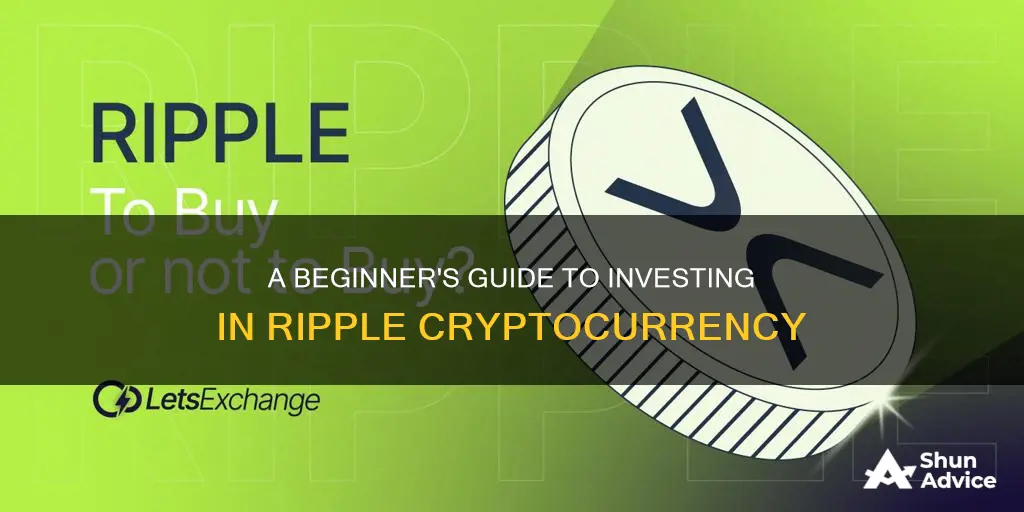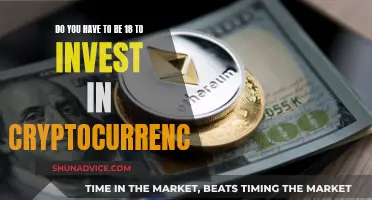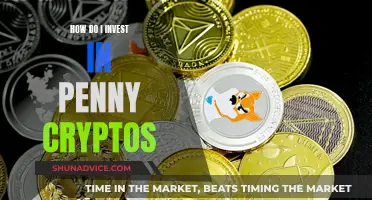
Ripple, or XRP, is a cryptocurrency with a unique history and a dedicated following. It was created by a private company intending to profit from it, which sets it apart from other cryptos. While it has faced legal challenges, it remains a popular choice for investors. In this article, we will explore the best ways to invest in Ripple, including buying it directly, using crypto exchanges, and investing in related startups. We will also discuss the risks and potential rewards of this volatile investment opportunity.
| Characteristics | Values |
|---|---|
| Company | Ripple |
| Coin | XRP |
| Current Market Position | Sixth most popular cryptocurrency by market cap |
| Price | $0.30 |
| Purchase Options | Uphold, Kraken, Coinmama, Coinbase, Binance, eToro, Bitstamp, Kraken, Huobi Global, Crypto ATMs, etc. |
| Purchase Process | Set up an account, choose a payment method, place an order, select a storage wallet |
| Wallet Options | Ledger, Trezor |
What You'll Learn

Where to buy Ripple
Ripple (XRP) is a cryptocurrency known for its speed and efficiency. It is designed to enable frictionless global money transfers. XRP can be purchased on several exchanges, including centralised and decentralised platforms. Here are some options for buying Ripple:
- Coinbase: Coinbase is a well-known and trusted crypto exchange platform that offers over 500 different cryptocurrencies, including Ripple. It accepts multiple fiat currencies and has relatively low trading fees.
- Bitstamp: Bitstamp is another popular exchange that offers XRP trading. It provides a wide range of trading features and digital currencies. In June 2024, it was announced that Bitstamp would be acquired by Robinhood.
- Kraken: Kraken is a regulated exchange where users can buy and sell XRP. It offers two-factor authentication for added security and supports various payment methods.
- Uphold: Uphold is a recommended platform for buying XRP, especially if you want to purchase using USD or other fiat currencies. It offers a user-friendly app and website, making it convenient for investors.
- Binance: Binance is a top-rated crypto exchange that provides a simple and straightforward platform for buying Ripple. It has a wide range of cryptocurrencies available and competitive trading fees.
- Decentralised Exchanges (DEXs): DEXs facilitate peer-to-peer crypto trading without a central intermediary. They rely on code and technology to execute transactions. While DEXs typically operate on a specific blockchain, some allow trading of assets built on separate blockchains.
- Crypto ATMs: Crypto ATMs provide a convenient way to buy XRP using cash or debit cards. Websites like ATM Locator and Coin ATM Radar can help you find XRP-supported ATMs in your area.
It is important to note that not all exchanges are regulated, and it is advisable to conduct due diligence before choosing a platform. Additionally, always prioritise security by enabling two-factor authentication and taking necessary precautions when trading cryptocurrencies.
District0x Coin: A Good Investment or Just Hype?
You may want to see also

How to buy Ripple
Ripple (XRP) is a cryptocurrency that is faster and more efficient than any other digital asset. It is intended to speed up global payments, which can currently take days. It is also different from many other popular cryptocurrencies because it was created by a private, for-profit company.
If you're looking to buy Ripple, there are a few different ways to do so. You can buy it on a centralized or decentralized cryptocurrency exchange, or even directly from another person.
Centralized Crypto Exchanges
Centralized crypto exchanges are online platforms that allow users to buy, sell, and trade cryptocurrencies. Examples of centralized exchanges that offer XRP include Bitstamp, Kraken, Huobi Global, and Coinbase. To buy XRP on a centralized exchange, you'll typically need to send fiat money (such as USD, EUR, or JPY) to the exchange via bank transfer and then use those funds to purchase XRP. Some exchanges also allow the use of payment cards or other cryptocurrencies to purchase XRP.
When using a centralized exchange, it's important to choose a strong password and enable two-factor authentication for added security. Additionally, be sure to research the exchange's costs and accepted payment options before selecting one.
Decentralized Exchanges (DEXs)
Decentralized exchanges facilitate crypto buying and selling without a third-party intermediary. DEXs typically function on a main blockchain and only facilitate the buying and selling of assets built on that blockchain. However, some assets, called "pegged" or "wrapped" assets, are versions of crypto assets that run on a separate blockchain, allowing them to be traded on a DEX.
Peer-to-Peer Transactions
Buying crypto peer-to-peer means purchasing it directly from another party, such as a family member or friend. This type of transaction usually requires an in-person meeting and involves setting up an XRP wallet to receive the tokens. However, it's important to note that conducting financial transactions with strangers can be dangerous.
Other Options
In addition to the above methods, XRP can also be purchased through peer-to-peer (P2P) services, decentralized finance (DeFi) platforms, cryptocurrency ATMs, payment processors, and mobile wallets. You can also earn XRP rewards through certain exchange programs.
When buying XRP, it's important to remember that it is subject to an SEC investigation, and many exchanges have delisted the token. Additionally, cryptocurrencies are high-risk investments, and it's important to do your research before investing.
Potcoin Investment Strategies: A Beginner's Guide
You may want to see also

How is Ripple different from other cryptocurrencies
Ripple (XRP) is different from other cryptocurrencies in several ways. Firstly, it was created by a private, for-profit company, Ripple Labs, to enable a frictionless way to send money globally. Secondly, it is not a Proof-of-Stake (PoS) cryptocurrency and does not use staking to validate transactions. Instead, it employs a unique consensus mechanism called the XRPL Consensus Protocol or Federated Consensus. This mechanism does not rely on mining, resulting in negligible energy consumption, lightning-fast transaction confirmations, and low transaction fees. Thirdly, XRP is not rewarded to network participants like in other blockchains; instead, a fixed amount of 100 billion XRP was created at the outset, with 80 billion given to Ripple Labs. Finally, XRP has a total supply of 100 billion, in contrast to Bitcoin's total supply of 21 million, making it cheaper and more scalable.
Bitcoin Investment: Which Companies are Worth Your Money?
You may want to see also

Pros and cons of investing in Ripple
Ripple (XRP) is a cryptocurrency and a digital payment network for financial transactions. It is currently the sixth most popular cryptocurrency by market cap. XRP is the native token for the XRP ledger, which was designed as a payment system for business purposes.
Pros
- Affordable solution for cross-border transactions: XRP can facilitate transactions across the globe quickly and securely.
- Partnerships with major banks: Ripple has forged partnerships with major banks such as American Express, Santander, and MoneyGram. It is also moving into developing Central Bank Digital Currencies (CBDCs).
- Recovering from the SEC case: XRP is recovering from a lawsuit with the US Securities and Exchange Commission (SEC). There is growing optimism that Ripple can win the case, which has put the price of XRP on an upward trajectory.
- Cheap transfer costs: The low cost of transferring XRP makes it a popular cryptocurrency for transferring value. XRP is, therefore, better suited for everyday payments.
- Solves problems and creates opportunities: Ripple solves problems for large financial institutions and speeds up the flow of capital, which is excellent for the economy. It could also work for small business owners by providing access to the global economy.
- Market cap: With a market cap of approximately $21.89 billion, Ripple is the world's sixth-biggest cryptocurrency. A large market cap is a strong sign of investor confidence and makes the asset more resistant to volatile market cycles or dips.
- Strong investors and partners: Ripple has partnerships with some of the most prominent institutions in the financial world, and many central banks have already made amendments to incorporate Ripple into their system.
- Faster transactions: The transaction speed offered by the Ripple Network is around 1,500 transactions per second (TPS), the second-highest transaction speed in the world after Visa.
- Less electricity usage: The Ripple Network ecosystem uses much less electricity compared to Bitcoin and Ethereum, making it more acceptable to some investors.
Cons
- No new Ripple will be mined: Unlike Bitcoin or Ethereum, there will only ever be a finite amount of Ripple as all the XRP coins are pre-mined and already in circulation.
- Ripple owns a massive share of XRP: Ripple Chairman Chris Larsen owns around a third of all XRP, and other senior board members hold a significant amount. With so much XRP concentrated in just a few hands, there's a chance the price may be overinflated.
- Not decentralised: XRP is not a 'real' cryptocurrency for blockchain purists. It was specially designed for the banking and finance industry, rather than to revolutionise the way ordinary people exchange or store value.
- SEC case is ongoing: There is still a risk that Ripple could lose the SEC case. The SEC may employ dirty tactics and take up unfair practices to make an example out of Ripple.
- Ripple and XRP are not the same thing: Many of Ripple's partners are looking for blockchain solutions, not to start using XRP. Therefore, the value of XRP should not reflect Ripple's success.
Dogecoin: A Long-Term Investment Worth Your Money?
You may want to see also

How to store Ripple
Storing Ripple (XRP) is slightly different from storing other cryptocurrencies like Bitcoin or Ethereum. Here are some of the ways you can store XRP:
Vaults
You can store your XRP in a vault with a trusted player like Gatehub or Coinbase. This is similar to storing your money in a bank, where you get an IOU for the Ripple you store. While this option provides security, there is a risk of losing your money if the company goes under.
Paper Wallet
You can open a paper wallet with a service like Rippex, where you can print out your keys and store them in multiple locations. This gives you physical access to your wallet and is a good option if you want to avoid online vulnerabilities.
Hardware Wallets
You can use hardware wallets like the Ledger Nano, which support multiple blockchain technologies. These are similar to USB devices and provide offline storage for your XRP. Make sure you don't lose the device as it's the only way to access your coins.
Exchange Brokerage Account
You can leave your XRP on the exchange in your brokerage account. However, this option may not provide the same level of security as other storage methods.
Hot Wallets
Hot wallets are stored online, making them more convenient for regular transactions. However, they are more vulnerable to hacking attempts due to their online nature.
Cold Wallets
Cold wallets are external storage devices such as hard drives or solid-state drives. They are considered more secure than hot wallets as they store your private keys offline, protecting your assets from online hacking attempts. However, losing your access codes may result in permanent loss of access to your assets.
Apollo Coin: A Smart Investment Decision?
You may want to see also
Frequently asked questions
Ripple (XRP) is a cryptocurrency with a unique structure and technical data, similar to Bitcoin and Litecoin. It was created by a private company and is often referred to as a "Bitcoin-killer" due to its faster transaction speeds and high level of security.
You can buy Ripple on several exchanges, such as Bitstamp, Kraken, Huobi Global, and Coinbase. It is also available on popular crypto exchange platforms like Binance, Uphold, and KuCoin. You can purchase it directly with fiat currencies like USD and EUR, or with another cryptocurrency, such as Bitcoin.
As with any cryptocurrency, investing in Ripple is considered high-risk due to its extreme price volatility. There is also the ongoing SEC investigation into Ripple and its impact on the availability of XRP on major exchanges. Always conduct thorough research and understand the risks before investing.
Ripple is currently the third most popular cryptocurrency by market cap, and it has a vast market presence. It has been touted as a "Bitcoin-killer" due to its faster transaction speeds and high security. Additionally, its low price point makes it an attractive investment option with the potential for high returns.
You can store your Ripple in a crypto wallet, such as a hot or cold wallet, or on a hardware wallet like Ledger.







